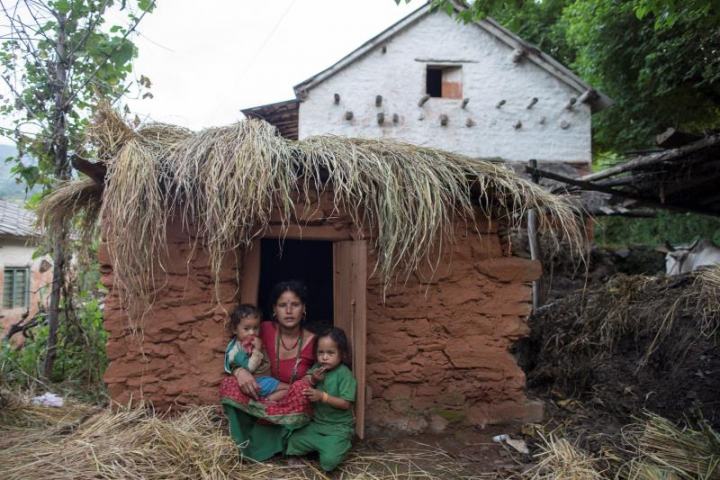Young Woman Dies in Fourth ‘Period Hut’ Tragedy This Year in Nepal
ASIA--PACIFIC, 18 Feb 2019
Rebecca Ratcliffe – The Guardian
Smoke inhalation thought to have killed 21-year-old exiled during menstruation despite ban on custom.

Naru Saud, aged 21, sits in a ‘Chaupadi’ shed with her two-year-old son in Biraltoli village in Acham district, Nepal, Sep. 19, 2017.
EPA-EFE/FILE/NARENDRA SHRESTHA
6 Feb 2019 – A 21-year-old woman has been become the fourth person known to have died this year as a result of the illegal practice of chhaupadi, whereby menstruating women in Nepal are banished from their homes and forced to sleep in huts.
Parbati Bogati, from the western Doti district, is thought to have died from smoke inhalation while sleeping in a small, windowless hut. She was discovered by her mother-in-law on Thursday morning.
Just weeks earlier Amba Bohara, 35, and her two sons, Ramit, nine, and Suresh, 12, were found dead in a cowshed. Their deaths, in neighbouring Bajura district, prompted some people to demolish chhaupadi sheds in their village.
Both women are believed to have suffocated after lighting fires to stave off freezing temperatures. Campaigners fear January may have been the worst month for such deaths in recent years, despite government efforts to end the practice, which has been banned since 2005.
Last year, penalties including a 3,000-rupee (£20) fine and a three-month jail term were introduced for those convicted of imposing the custom. However, chhaupadi, linked to Hindu religion, is deeply embedded in some parts of Nepal.
Watch: The menstruating Nepalese women confined to a cowshed
The tradition dictates what a woman can eat, where she can sleep and with whom she can interact while she is menstruating.
“It has been followed from the very beginning, from their ancestors, so if they discontinue with that kind of ritual, they fear that the god will punish them,” said Dechen Lama, a lawyer at the Forum for Women, Law and Development.
In 2010, a government survey found that one in five women across the country followed the practice. In Nepal’s mid-western and far-western regions, half of women surveyed did so.
In the capital, Kathmandu, versions of the tradition are still practised, said Lama. “[Women] are not isolated to the same extent – there is no separate hut – but they are not allowed to enter the kitchen when they go through menstruation, and they are not to touch the idols of god.”
Ganga Chaudhary, a lawmaker who was involved in the drafting of the legislation, told Agence France-Presse that much more must be done to enforce the law and change social norms.
“We have realised that legal provisions [alone] are not enough to end such practices. We need to focus on awareness and educating women,” Chaudhary said.
Go to Original – theguardian.com
DISCLAIMER: The statements, views and opinions expressed in pieces republished here are solely those of the authors and do not necessarily represent those of TMS. In accordance with title 17 U.S.C. section 107, this material is distributed without profit to those who have expressed a prior interest in receiving the included information for research and educational purposes. TMS has no affiliation whatsoever with the originator of this article nor is TMS endorsed or sponsored by the originator. “GO TO ORIGINAL” links are provided as a convenience to our readers and allow for verification of authenticity. However, as originating pages are often updated by their originating host sites, the versions posted may not match the versions our readers view when clicking the “GO TO ORIGINAL” links. This site contains copyrighted material the use of which has not always been specifically authorized by the copyright owner. We are making such material available in our efforts to advance understanding of environmental, political, human rights, economic, democracy, scientific, and social justice issues, etc. We believe this constitutes a ‘fair use’ of any such copyrighted material as provided for in section 107 of the US Copyright Law. In accordance with Title 17 U.S.C. Section 107, the material on this site is distributed without profit to those who have expressed a prior interest in receiving the included information for research and educational purposes. For more information go to: http://www.law.cornell.edu/uscode/17/107.shtml. If you wish to use copyrighted material from this site for purposes of your own that go beyond ‘fair use’, you must obtain permission from the copyright owner.